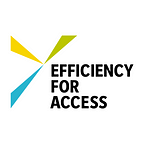Chris Beland is a Senior Project Manager at Energy Saving Trust, and leads the Efficiency for Access Research and Development Fund, funded by UK aid and the IKEA Foundation. He studied Geography with Environmental Science and Management at the University of Exeter and then completed his Master’s in Environmental Technology at Imperial College London. After graduating, he worked in renewables, before becoming an energy, environment and climate change consultant. He came to Energy Saving Trust in 2018, where he leads the Efficiency for Access Research and Development Fund and helped to run the first year of the Efficiency for Access Design Challenge, which is also funded by UK aid and the IKEA Foundation.
In this interview, he discusses his experience running the Efficiency for Access Design Challenge and advice he would give to current participants, as well as his career in sustainable development. He also talks about the future of energy access and the innovations he is the most excited about.
What advice would you give students participating in the Efficiency for Access Design Challenge 2020 –2021?
Perhaps it goes without saying, but my main piece of advice would be to think about the end-user you’re trying to design your product or service for. This has to be the starting point for any innovation process. Make sure you do your research on the technologies that are already available in the market, and then give deep consideration to what you are trying to do that is distinctly different. It is also important to build an understanding of the market size or opportunity into your research into your design process — if the market isn’t there then your product won’t be viable!
What was your experience of the Efficiency for Access Design Challenge?
I helped to bring the concept of the Efficiency for Access Design Challenge to life and make it the exciting competition it is today! My role was to lead the overall strategy and direction of the Challenge. Creating a new competition is challenging and exciting, but it wouldn’t be possible without the fantastic team effort from Energy Saving Trust and Engineers without Borders UK. In February 2020, I was lucky enough to meet the participating student teams from Makerere University in Uganda. After all the effort in developing the competition, it was incredibly heart-warming to see the enthusiasm and level of engagement I saw from the students; it wasn’t just a concept anymore, it was very real!
What advice would you give to someone who wanted to pursue a career in sustainable development?
Good question! I studied environmental science at undergraduate level, not knowing exactly what I wanted to do as a career, but I always followed what I found to be the most interesting. This led me to focus more on sustainable energy, firstly in a UK context, but then broadening my horizons and working in international development. I always knew I wanted to make a positive change to the world in my career, but it was a question of understanding what that was. For some people, they know exactly what this change will be, but for the vast majority, isn’t always so straightforward! So, my advice would be to follow your passion.
At Energy Saving Trust, you manage the Efficiency for Access Research and Development Fund. Could you please tell us what your job entails and what a normal working day looks like?
Define normal! No working day looks the same (though COVID-19 has certainly influenced that). I feel very lucky to be able to enable such positive impact under the Efficiency for Access Research and Development Fund. The Fund supports organisations in undertaking R&D in both technology and business model innovations. My job involves a lot of engagement with a variety of stakeholders, speaking with companies, research institutions and impact investors, to try and accelerate R&D that will ultimately benefit end-users who currently do not have access to modern energy services. Another aspect of my role is to identify the next new technology that the Fund can help organisations develop and bring to market.
Are there any emerging technologies, trends or fields in the energy access sector that you are particularly excited about?
I’m excited by the momentum of interoperability in the off-grid solar sector. The first Pay-As-You-Go ((PAYGO) companies have played a critical role in pioneering the uptake of affordable solar home systems, particularly in East Africa. As we look to build on that, it will be increasingly important for off-grid customers to have access to a wider range of appliances from multiple suppliers. Interoperability is central to this, as it can make appliances more affordable and reduce the amount of e-waste produced from the off-grid solar sector. Beyond interoperability, though COVID-19 is a challenging context, the increased focus on cold chains will help to accelerate refrigeration and cold storage technology and business model development, which the Efficiency for Access Research and Development Fund has been supporting since its inception. There are many other technologies we are also excited about; I recommend taking a look at the portfolio of projects we are supporting here!
